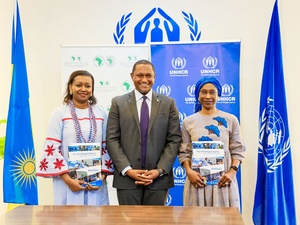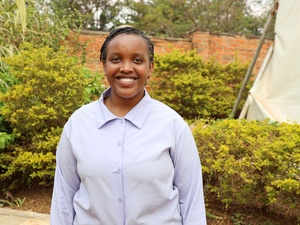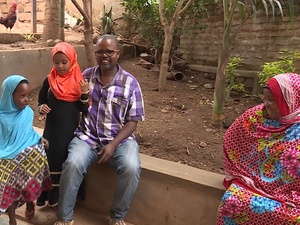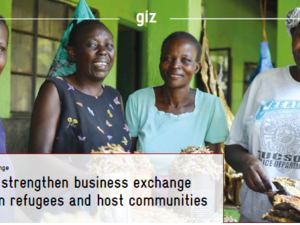The art of economically managing disaster
The art of economically managing disaster

Whether their presence has a significant economic contribution to the private sector or not is dependent on legal and non-legal barriers in the labour market.
A Taste Of Success
When Gilbert Ngongo’s life was interrupted in 1999 by violence instigated by the Mai-Mai in DRC’s Southern Kivu region, he fled to Rwanda with his family leaving behind everything he owned, including a robust fishing enterprise.
“Beginning afresh in another country is difficult. I had left everything behind when the Mai-Mai attacked. I did not have time to carry any property or documents,” said Ngongo. However, through the assistance of the United Nations High Commission for Refugees (UNHCR), he obtained a document that declared him eligible for employment in Rwanda.
“This document gave me freedom to work for a minimum of Rwf 700 per day,” he said. And after two years of toiling, Ngongo saved enough money to start a new fishing business in Rwanda.
“I saved Rwf 28,000 and bought local fish from the market to supply restaurants and bars,” he explained. “Over time, I made orders directly from a fish truck that imported tilapia from Uganda.”
Today, Ngongo has a medium-sized business in Nyamirambo called Sea Food Ltd, popular for supplying international seafood. He imports from Tanzania, Kenya, Zambia, Alaska, Belgium, and Norway and supplies his clients with a wealth of seafood, including: tilapia, tuna, salmon, prawn, squid, lobster, sardine, shrimp, crab, silver fish, long fish, swordfish, oysters, frogs’ legs, and octopus.
In an attempt to dispel a popular refugee belief that refugees cannot succeed in Africa, Ngongo argues that refugees can participate in economic development. He employs five people and supports over 30 family members.
A Real-Time Influx
At a time when Rwanda was receiving refugees in the tens of thousands, Ngongo’s situation was not unique. Rwanda has taken in refugees from the Democratic Republic of Congo, Burundi, Angola, Afghanistan, Kenya, Eritrea, Somalia, Chad, Central African Republic, Haiti, and Uganda.
The UNHCR indicates that as of October 2015, over 144,000 refugees currently reside in Rwanda, with almost 27,000 living in urban settings.
This movement of people into Rwanda’s borders has some challenging implications: inflation of property and food prices, deflation of labour wages, and competition for natural resources.
At the Ministry for Disaster Management and Refugee Affairs (MIDIMAR), the Refugee Unit Director emphasises that “Urban refugees are not exactly living with humanitarian assistance as camp refugees. They have to find a way to earn an income and sustain themselves. They have to pay rent, buy food, and educate their children.”
“If more refugees are empowered, they can contribute to Rwanda’s economic growth. We encourage urban refugees to get involved in businesses so they can become self-reliant. This is not a small population. They too can participate in driving the economy once established,” Rwahama said.
Net Economic Gains
In Rwanda, UNHCR assists refugees across six refugee camps, three transit centres, and urban areas. The recent surge in refugees has cost Rwanda’s UNHCR approximately USD 43 million as of October 2015. And only about half of the total refugee budget goes through UNHCR; the other half is channelled into Rwanda through other relief partners.
Jakob Øster, the Associate Livelihoods Officer at UNHCR Kigali, said that the key to making refugees self-reliant is a market-based approach.
“We listen to what the labour market and the private sector needs in Rwanda. We look at refugees as consumers, suppliers, and employees,” Øster said, adding that, “It is in the interest of Rwanda’s government to have more refugees work in the formal sector and increase tax revenue.”
Contrary to popular perceptions, Øster believes that an inflow of refugees can stimulate economic activity.
“It becomes very clear that if you dig a little deeper, you will find that anybody who tells you that refugees are a burden to any host community is completely wrong,” Øster said.
Host communities can benefit economically in a number of ways, including: through trade with the host country’s communities, employment, the local purchase of products and services, shelter material, expenditures of aid workers, foreign currency exchange from humanitarian agencies supplying relief, as well as rent, education, and asset expenses incurred by urban refugees.
And because the Rwandan government gives refugees the right to work, the right to start companies, and the freedom of movement, Øster says that, “The private sector needs to know that refugees have the legal right to work.”
Øster emphasised, “The problem is that a lot of companies in Rwanda I have spoken to, including the Private Sector Federation, are under the mistaken belief that they are not allowed to hire refugees; that is not the case. They are indeed allowed to hire refugees.”
Brain Gain Versus Brain Drain
Refugees have also created a mass flow of humanitarian NGOs and UN agencies into the country working to provide relief. All these organisations create jobs for locals. For example, UNHCR employs about 100 Rwandans in addition to foreign workers.
While the perfect world would be one without situations that result in refugees, according to Øster, spending this aid money within Rwanda boosts the consumption of goods and services to the benefit of the private sector.
“Map out the combined economic impact of refugees in Rwanda, and you will see a multi-million dollar figure – an advantage to Rwanda’s economy,” he said. “There is a brain gain for Rwanda as opposed to a brain drain. The refugee influx is of people coming from across all strata of society who can work and they have skills.”
While the majority of refugees are situated in rural area camps, it is possible that with sensitisation, more actors in Rwanda’s private sector will tap into the economic advantages that come with hosting refugees.
A case in point is the Mahama Camp in Kirehe District of Eastern Rwanda that hosts over 50,000 Burundian refugees. Øster likens it to “a big city” due to its populace.
“If the Rwandan government, together with development actors and UNHCR, work to turn Mahama into an economically vibrant city, it will be to the benefit of this very remote and poor area of Rwanda.
“After one month of the camp’s establishment, by their own initiative, MTN Rwanda set up a tower because they saw the potential of 50,000 clients. That is a concrete example of how a private sector company taps into the economic potential of refugees,” he said.
A Stitch In Time
Zoao Agnes Maseku fled conflict in Angola with her family as a young girl and relocated to Goma, fleeing again to Rwanda in 1996 when war broke out. Part of four generations of tailors, Maseku has been running her small tailoring business in Rwanda for nearly 18 years. At 58 and the mother of five, she received a stipend of Rwf 162,000 through UNHCR almost twenty years ago, and bought two sewing machines, fabric, and a table to jumpstart her business at the small house she rented. After accumulating enough savings, she was able to buy a small house in the Kimichanga area.
Small businesses such as this not only foster self-reliance, but also contribute to the economy. Small investments, such as Maseku’s Rwf 162,000 can provide considerable returns to enhance the country’s economy.
However, there are limitations that come with integrating refugee workers. Refugees can become more productive members of society, but they still suffer from relatively limited access to employment, finance, upper secondary and tertiary education, and vocational training, among other issues. This is due to a mix of legal and non-legal barriers.
Not Everyone Benefits
Indeed, not all refugees enjoy the successes that Maseku and Ngongo have. While the legal right to work is never a guarantee for employment or a successful business, status as a refugee can add a layer of difficulty.
This has been the reality for Melance Nkurunziza, a Burundian refugee and food hygiene expert. “It took me only two days to register my business because I had all the necessary documents required,” said Nkurunziza, who trains at restaurants, schools, and organisations. Yet his business has seen little growth over the past five months he has spent in the country, and he has had difficulty finding clients. “I am legally covered to work in Rwanda,” he said, “but people don’t believe what you say as a refugee seeking employment. No one will respond to your proposal.”
However, while all refugees can legally start their own businesses, refugees are not necessarily eligible for all jobs. Jordi Michel Musoni, a lawyer and Trade Unionist who is part of the Steering Committee for migrant workers at the International Organisation for Migration (IOM), describes the dynamics of migrant employment.
“Refugees have a right to work in the private sector and are covered within the legal frameworks of UNHCR,” Musoni said. However, in order to protect Rwanda’s workers, Musoni explains that there are specific jobs allocated on the Occupation Demand List (ODL) for migrant workers that require a certain set of skills. This aims at reducing competition for low-skilled jobs that locals can do. Hence, not all refugees can be employed legally.
Still, an influx of refugees has the potential to contribute to Rwanda’s labour market and private sector. They are a potential contributor to economic growth, especially when legal and non-legal barriers are curbed.
Written by GLORIA IRIBAGIZA
Accelerator Magazine
Kigali - 1 January 2016









